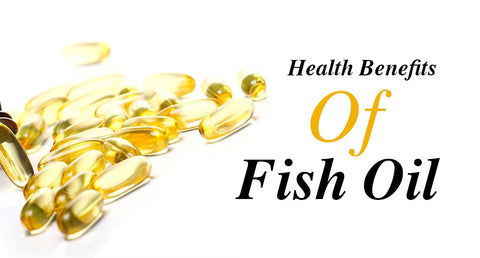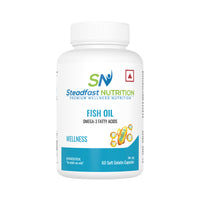Fish oil is a rich source of omega-3 polyunsaturated fatty acids, essential for physical and mental health. Because the body cannot produce omega-3s by itself, they are essential fatty acids and must be obtained through diet or supplementation.
Omega-3s have many health benefits, including improved heart and skin health, better mood, memory, joint flexibility, mobility, and increased energy levels.
There are three types of omega-3 polyunsaturated fatty acids:-
- Eicosapentaenoic acid (EPA)
- Docosahexaenoic acid (DHA)
- Alpha-linolenic acid (ALA)
EPA and DHA are the two primary marine-derived omega-3s and are abundant in cold water fatty fish such as sardines, salmon, herring, and mackerel.
Fun fact: Omega-3 fatty acids are produced by microalgae, which are consumed by tiny phytoplankton. The fish store the essential nutrients in their tissues and pass them on to people who eat them, but these omega 3s are synthesised by the microalgae and not the fish itself. {Source Harris WS. Omega-3 fatty acids. In: Coates PM, Betz JM, Blackman MR, et al., eds. Encyclopedia of Dietary Supplements. 2nd ed. London and New York: Informa Healthcare; 2010:577-86.}
ALA is a type of omega fatty acid that comes from plants rather than animals. It is found in green leafy vegetables, vegetable oils, nuts, and flax seeds.
What Is Fish Oil? (Health Benefits of Omega-3 Fatty Acids)
Fish oil, a source of omega-3 fatty acids, is needed to carry out many functions in the body—from the synthesis of inflammation-regulating hormones to cell growth and development.
Omega-3 fatty acids are essential fats your body can't produce. Fish oil contains two omega-3s: Docosahexaenoic acid (DHA) and Eicosapentaenoic acid (EPA).
The primary dietary sources of DHA and EPA are fish and shellfish. Another omega-3 fatty acid- Alpha-linolenic acid (ALA) is found in nuts, seeds, and vegetable oils.
People who cannot meet their daily omega-3 requirements from food sources should take fish oil soft gelatin capsule supplements, which improve health and fulfill the daily requirement. These omega 3 capsules contain DHA and EPA extracted from fish - provides you with all the benefits without eating fish every other day and are easy to consume, convenient, and affordable.
Health Benefits of Fish Oil
Omega 3 polyunsaturated fatty acid benefits are immense- they’re essential for normal physiological function and play many roles in the body, most notably as components of phospholipids that form cell membranes. Omega-3 fatty acids provide structure to cell membranes, give the body energy, and are used to form compounds called eicosanoids— signalling molecules that perform a variety of functions in the cardiovascular, pulmonary, immune, and endocrine systems.
Fish Oil For Healthy Heart
Fish oil and other Long-chain omega-3 supplements reduce levels of triglycerides in the blood and increase levels of HDL (good cholesterol), reducing the risk of cardiovascular disease among people with low dietary intakes. It has reduced blood pressure in people with high BP.
The evidence for omega-3 supplementation providing a protective effect against heart disease is more in people who already have coronary disease.
Overall, research shows eating fish as part of a balanced diet helps promote heart health and decreases the risk of cardiovascular disease when people choose it over foods with less nutritional value.
Fish Oil For Healthy Brain
Fish oil is a great way to keep your brain healthy. Studies show that omega-3 fatty acids help to preserve the integrity of brain cell membrane phospholipids and may offer protection against memory loss and other forms of cognitive decline.
Fish Oil helps prevent memory problems, brain fog, and other issues that can occur as you age. Research says Alzheimer's patients tend to have lower DHA levels than healthy people. A low level of DHA is associated with an increased risk for cerebral amyloidosis (build-up of protein deposits called amyloids) and brain volume loss in these cases. A study published in JAMA (Journal of the American Medical Association) Neurology found that fish oil may help prevent the build-up of amyloid plaques associated with dementia.
In 2016, a dose-response meta-analysis of 21 cohort studies found that a higher intake of fish and omega-3 fatty acids was associated with a 14% lower risk of dementia and a 37% lower risk of Alzheimer's disease.
Fish Oil For Healthy Skin
The anti-inflammatory properties of omega-3s are responsible for their ability to improve skin health. Omega-3 fatty acids improve skin dryness and inflammation. They help cells repair themselves, healing damaged skin layers by improving their overall condition.
Omega-3 fatty acids benefits do not cure severe skin conditions like psoriasis or seborrheic dermatitis. However, they are linked with improved body immunity and increased resistance to infections—which indirectly provide some relief from the symptoms.
Fish Oil For Weight Loss
Fish oil may help people lose weight by increasing satiety, reducing hunger pangs and appetite. This effect may be beneficial for individuals on diets who often feel hungry.
In a study of people on a weight-loss diet, participants noted feeling fuller two hours after meals if they consumed more than 1.3 grams of omega-3 fish oil a day than when they took less than 0.3 grams per day or no supplements at all.
Additional studies are needed to explore these hypotheses.
Fish Oil For Eye Health
Eye health is an essential part of overall health. Many factors can affect your eyes and their ability to work correctly, such as ageing or certain medical conditions. DHA is a structural lipid in retinal cellular membranes, and EPA-derived eicosanoids have beneficial effects on inflammation. Research suggests these long-chain omega-3s may help prevent age-related Macular Degeneration (AMD) progression.
Fish Oil Benefits For Men

Fish oil may help raise sperm count and quality. In a Danish study published in 2019, researchers found that men who reported fish oil intake had higher testosterone levels and produced more sperm than those who had not recently consumed fish oil.
Fish Oil Benefits For Women

Fish oil is an essential dietary supplement that can help support a healthy pregnancy. Omega-3 fatty acids are known to play a role in the development of the foetus’s eyes, brain, and nervous system. Several studies have explored the positive effects of a seafood diet and omega-3 intake on infant birth weight, length of gestation, visual development, and other indicators.
How To Consume Fish Oil?
Omega-3 fatty acids are essential for keeping your body healthy.
A healthy diet should include at least 1–2 servings of fatty fish per week, but most of us fall short of this goal. If you don't get enough omega-3s in your diet, don’t eat enough fish, or are vegetarian, you may not be getting the right amount of beneficial fats in your system.
If you want to make sure that you're getting all the omega-3s you need to maintain a healthy body, consider taking a fish oil supplement. These supplements can help people who cannot meet their dietary requirements for this nutrient.
Best Time To Take Fish Oil
The benefits of fish oil are most often experienced over a long period, so you can take this supplement at any point during the day. However, since it's more effective to absorb and digest fat-soluble vitamins such as DHA with food (which contains fat), having one serving/capsule immediately before or after a meal is best. {Source https://pubmed.ncbi.nlm.nih.gov/}
The Best Fish Oil Supplement:
Steadfast Nutrition’s Fish Oil contains high-quality omega-3 fatty acids extracted from sardines, which have been found to have the lowest levels of mercury. The oil is free of steroids, heavy metals, and other impurities.
Steadfast Nutrition’s Fish Oil boosts heart and brain health, strengthens bones, reduces inflammation, improves skin health, and improves sleep quality. It contains EPA and DHA in a ratio of 3:2, which is the best for human consumption.
Dosage and Recommendation
Remember that the amount of omega-3 fatty acids you need will depend on your overall health and body weight.
Although the World Health Organization recommends that adults consume 1.1-1.6 grams (1,100–1600 mg) of Alpha-linolenic acid each day through the diet or supplements, there is no official recommendation for how much omega-3s, DHA & EPA we should consume each day.
The table below lists the ALA, EPA, and DHA content of several foods.
|
Food |
Grams per serving |
||
|
|
ALA |
DHA |
EPA |
|
Flaxseed oil, 1 tbsp |
7.26 |
|
|
|
Chia seeds, 1 ounce |
5.06 |
|
|
|
English walnuts, 1 ounce |
2.57 |
|
|
|
Flaxseed, whole, 1 tbsp |
2.35 |
|
|
|
Salmon, Atlantic, farmed cooked, 3 ounces |
|
1.24 |
0.59 |
|
Salmon, Atlantic, wild, cooked, 3 ounces |
|
1.22 |
0.35 |
|
Herring, Atlantic, cooked, 3 ounces* |
|
0.94 |
0.77 |
|
Canola oil, 1 tbsp |
1.28 |
|
|
|
Sardines, canned in tomato sauce, drained, 3 ounces* |
|
0.74 |
0.45 |
|
Mackerel, Atlantic, cooked, 3 ounces* |
|
0.59 |
0.43 |
|
Salmon, pink, canned, drained, 3 ounces* |
0.04 |
0.63 |
0.28 |
|
Soybean oil, 1 tbsp |
0.92 |
|
|
|
Trout, rainbow, wild, cooked, 3 ounces |
|
0.44 |
0.40 |
|
Black walnuts, 1 ounce |
0.76 |
|
|
|
Mayonnaise, 1 tbsp |
0.74 |
|
|
|
Oysters, eastern, wild, cooked, 3 ounces |
0.14 |
0.23 |
0.30 |
|
Sea bass, cooked, 3 ounces* |
|
0.47 |
0.18 |
|
Edamame, frozen, prepared, ½ cup |
0.28 |
|
|
|
Shrimp, cooked, 3 ounces* |
|
0.12 |
0.12 |
|
Refried beans, canned, vegetarian, ½ cup |
0.21 |
|
|
|
Lobster, cooked, 3 ounces* |
0.04 |
0.07 |
0.10 |
|
Tuna, light, canned in water, drained, 3 ounces* |
|
0.17 |
0.02 |
|
Tilapia, cooked, 3 ounces* |
0.04 |
0.11 |
|
|
Scallops, cooked, 3 ounces* |
|
0.09 |
0.06 |
|
Cod, Pacific, cooked, 3 ounces* |
|
0.10 |
0.04 |
|
Tuna, yellowfin, cooked 3 ounces* |
|
0.09 |
0.01 |
|
Kidney beans, canned ½ cup |
0.10 |
|
|
|
Baked beans, canned, vegetarian, ½ cup |
0.07 |
|
|
|
Ground beef, 85% lean, cooked, 3 ounces** |
0.04 |
|
|
|
Bread, whole wheat, 1 slice |
0.04 |
|
|
|
Egg, cooked, 1 egg |
|
0.03 |
|
|
Chicken, breast, roasted, 3 ounces |
|
0.02 |
0.01 |
|
Milk, low-fat (1%), 1 cup |
0.01 |
|
|
*Except as noted, the USDA database does not specify whether fish is farmed or wild-caught.
**The USDA database does not specify whether beef is grass-fed or grain fed.
{Source https://fdc.nal.usda.gov/}
Conclusion
The health benefits of fish oil are well established. It can be a useful dietary supplement for your health. It is a necessary part of a healthy diet, and it is easily accessible in many different forms. Fish oil contains Omega-3 fatty acids, which are essential for the body. The best way to consume fish oil is by eating it as part of your daily meals. If you cannot eat fish or want to supplement your diet with additional Omega-3s, using fish oil supplements will give the required health benefits. Buy Omega 3.
References
The information in this article is based on the studies and research mentioned in the link:- https://ods.od.nih.gov/


